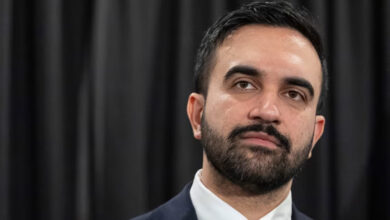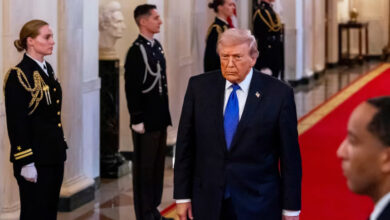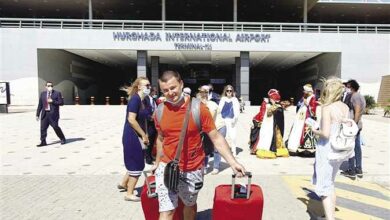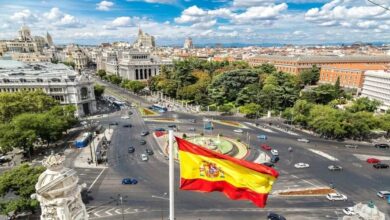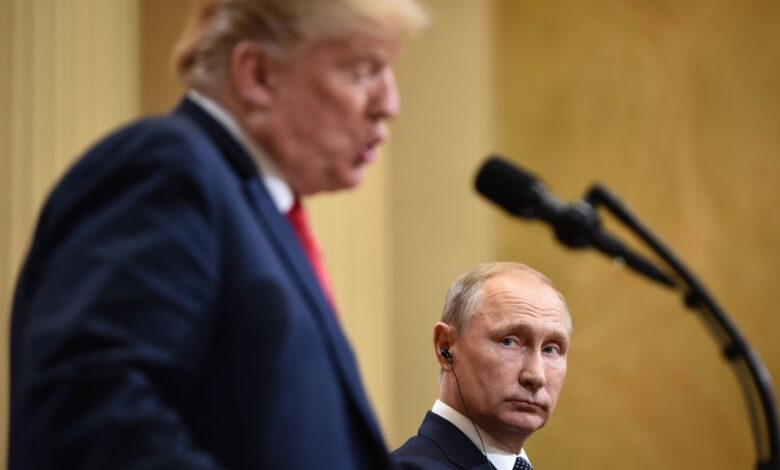
December 31, 1999: Russian President Boris Yeltsin took to the airwaves to make a surprise announcement, telling his fellow countrymen that he would step aside for his prime minister to take over as president.
“Why cling to power for six more months when the country has a strong leader who can be its president, a man on whom nearly all Russians are pinning their hopes for the future?” Yeltsin said, acknowledging the pain inflicted on ordinary Russians by the collapse of the Soviet Union. “Why stand in his way?”
That strong leader was a political unknown: a former KGB officer named Vladimir Putin. This New Year’s Eve, when Putin addresses Russians, he will be marking a quarter-century as Russia’s first man, both as president and during a four-year interregnum as a powerful prime minister.
As 2024 draws to a close, Putin’s grip on power appears more secure than ever. On the battlefield in Ukraine, Russian forces have made progress in a grinding war of attrition, advancing in the Donbas region. At home, Russia’s political landscape has been swept clear of competition following the death of the country’s most prominent opposition leader, Alexey Navalny.
And a month after Navalny died in a remote prison north of the Arctic Circle, the Kremlin leader sailed to reelection in a race that allowed him to claim an overwhelming mandate, fair play be damned.

Putin may be projecting confidence, but fresh uncertainty is around the corner. US President-elect Donald Trump campaigned on a promise to bring an end to Russia’s war on Ukraine. And while his roadmap for a negotiated end to the conflict is far from obvious, Trump has made one thing clear: He wants it to happen fast.
“(It is) one of the things I want to do and quickly – and President Putin said that he wants to meet with me as soon as possible,” Trump said at a recent event in Arizona. “So, we have to wait for this. But we have to end that war.”
Little wonder that champagne corks did not pop in Moscow following Trump’s reelection. Putin has staked everything on the war in Ukraine: He put his country’s economy on a war footing; forged closer alliances with North Korea and Iran to keep the war machine running; and landed on the International Criminal Court’s wanted list, all in pursuit of the maximalist aim of demolishing Ukraine’s viability as a state.
To be sure, Trump and Putin have some common ground. The 2018 Helsinki summit between the two showed that Trump was willing to shred long-established norms in the conduct of foreign policy, just as Putin is, and Trump’s professed admiration for Putin’s strongman character, has US observers worried about authoritarian tendencies at home. But Trump’s mercurial approach to foreign policy means the Kremlin may need to prepare for an unpredictable negotiation.
Trump’s incoming special envoy for Russia and Ukraine, retired Army Lt. Gen. Keith Kellogg, has likened the war to a “cage fight” between the two countries that Trump can referee.
“You’ve got two fighters and both want to tap out, you need a referee to kind of separate them,” he said on Fox Business. “I think President Donald J. Trump can do that… I think he’s actually got both sides willing to get together – eventually – and talk.”

How that analogy will work in practice is an open question. Ukrainian President Volodymyr Zelensky in recent weeks has shifted his rhetoric, conceding that Ukraine does not have the strength to win back all of the territory it has lost to Russia. And in his year-end question-and-answer session, Putin too signaled a readiness for negotiation, saying, “Politics is the art of compromise. We have always said that we are ready for both negotiations and compromises.”
But beyond platitudes, Putin gave few specifics – and spent most of his marathon televised year-end Q&A telegraphing a position of strength, both to ordinary Russians and to the incoming Trump administration.
The Kremlin leader, for instance, pushed back against a question from NBC’s Keir Simmons, who asked whether embarrassing foreign-policy setbacks such as the fall of the regime of Syrian President Bashar al-Assad, who recently took refuge in Russia, meant he would negotiate from a position of weakness.
Putin’s answer was: “We came to Syria 10 years ago to prevent the creation of a terrorist enclave there, like the one that we saw in some other countries, for example, Afghanistan. We have achieved that goal, by and large.”
Russia does still have some diplomatic leverage in the Middle East despite the collapse of the Assad regime.
Hanna Notte, Eurasia program director at the James Martin Center for Nonproliferation Studies, a US non-profit, said Russia still has “bargaining chips” over Syria, including Moscow’s status as a permanent member of the United Nations Security Council.
“Russia’s role on the UN Security Council – where it can either use its veto or not – is significant to HTS (Syria’s de facto rulers Hayat Tahrir Al-Sham) when it comes to all the kinds of processes related to the legitimization of a new Syrian government,” she said. “Any kinds of processes that relate to, now, a political transition in a post-Assad period, if the United Nations is involved, I think you would not want the Russians on the wrong side of this.”

On the economy, Putin is also sticking to positive talking points, even as ordinary Russians feel the pain from high food prices and a plummeting ruble. But spin can only go so far. In a recent analysis, Alexandra Prokopenko, a fellow at the Carnegie Russia Eurasia Center, a think tank based in Berlin, noted that Russia’s overstimulated wartime economy may be approaching a crisis point.
“Each passing month intensifies the pressure,” she wrote. “The Kremlin is approaching a tipping point when the social contract between the state and the people will inevitably shift. Russians are increasingly being asked to accept rising inequality and a decline in quality of life in exchange for short-term stability and symbolic pride in the idea of a ‘fortress nation.’ But even this compromise is becoming less and less sustainable.”
Putin came to power 25 years ago on a promise of strong rule after a decade of collective trauma during the Yeltsin era. He and his country must now face Trump in a new time of troubles.

